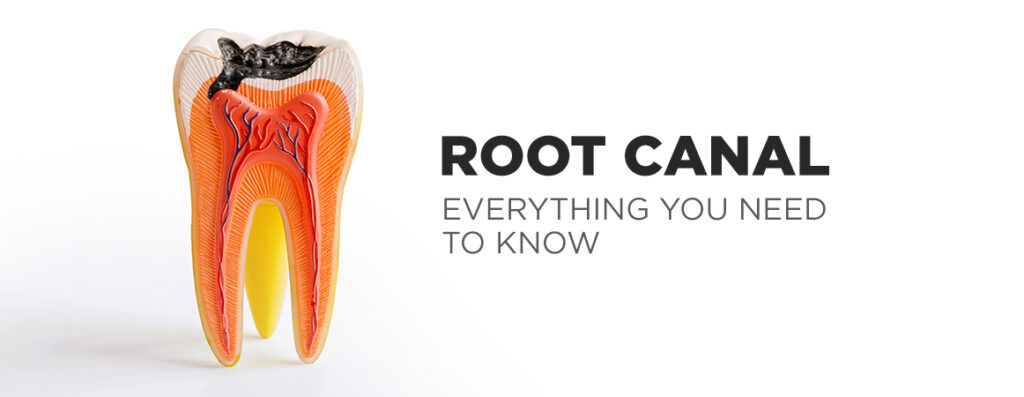Root Canal: Everything You Need to Know
What is a Root Canal?
A root canal, technically known as endodontic therapy, is a dental procedure designed to treat infection or damage within the pulp of a tooth. The pulp, found in the tooth’s center, is made up of connective tissues, blood arteries, and nerves. When the pulp becomes infected or inflamed due to deep decay, trauma, or repeated dental procedures, a root canal is necessary to remove the infected tissue and save the tooth from extraction.
Why Root Canal is Needed?
Root canal treatment becomes necessary when the pulp of a tooth becomes infected or damaged beyond repair. This may happen for several reasons, such as:
- Deep Decay: Untreated cavities can progress deep into the tooth, reaching the pulp and causing infection.
- Trauma: A traumatic injury to the tooth, such as a crack or fracture, can expose the pulp to bacteria, leading to infection.
- Repeated Dental Procedures: Multiple dental procedures, such as crowns or fillings, might cause problems for teeth that require root canal therapy.
- Cracked Tooth Syndrome: Cracks in the tooth can extend into the pulp, allowing bacteria to infiltrate and cause infection.
- Abscess: An abscess, or a pocket of pus, may form at the root of the tooth due to untreated infection, causing severe pain and swelling.
By removing the infected or inflamed pulp, cleaning and disinfecting the root canal system, and sealing the space to prevent reinfection, root canal treatment aims to preserve the natural tooth structure and restore oral health.
How Long Does a Root Canal Take?
The duration of a root canal procedure varies depending on several factors, including the tooth’s location, the severity of the infection, and the complexity of the root canal system. One to two hours are typically needed to conduct a root canal. However, more complex cases may require multiple appointments or extended treatment sessions.
During the initial appointment, the dentist will assess the tooth’s condition, take X-rays to evaluate the extent of the infection, and administer local anesthesia to ensure the patient’s comfort. Once numbness is achieved, the dentist will create an opening in the tooth to access the pulp chamber and root canals.
Using specialized instruments, the dentist will carefully remove the infected or damaged pulp tissue, clean and shape the root canals, and irrigate the area to remove any debris or bacteria. Depending on the severity of the infection, the dentist may apply medication to the root canal system to eliminate remaining bacteria and reduce inflammation.
After thorough cleaning and disinfection, the root canals are filled with a biocompatible material to seal the space and prevent reinfection. Sometimes, the tooth needs to be protected by a temporary filling while a permanent treatment, such as a crown, is being installed.
Post-Treatment Care and Recovery
Following a root canal procedure, it’s essential to follow the dentist’s post-treatment instructions to promote healing and prevent complications. This may include:
- Avoid chewing on the treated tooth until it is fully restored with a permanent crown or filling.
- Taking prescribed antibiotics or pain medication as directed.
- Practicing good oral hygiene, including brushing and flossing regularly.
- Showing up for follow-up visits to track progress and make sure the treatment is working.
While some mild discomfort or sensitivity may be experienced following a root canal, most patients can resume normal activities shortly after the procedure. After receiving a root canal, a tooth can continue to operate correctly for many years with the right maintenance and care.
Conclusion
A root canal is a beneficial dental procedure that can prevent the extraction of a severely damaged or infected tooth. By understanding what is a root canal, why a root canal is needed, and what to expect during the procedure, patients can approach treatment with confidence and ease. If you experience symptoms such as severe toothache, swelling, or sensitivity to hot and cold temperatures, consult with a dentist .
Post Disclaimer
The information contained in this post is for general information purposes only. The information is provided by "Root Canal: Everything You Need to Know "and while we endeavour to keep the information up to date.
Legal Disclaimer
We do not claim to cure any disease which is considered’ incurable ‘ on the basis of scientific facts by modern medicine .The website’s content is not a substitute for direct, personal, professional medical care and diagnosis. None of the medicines mentioned in the posts ,including services mentioned at "medicineguide.us" should be used without clearance from your physician or health care provider.
Testimonials Disclaimer– : Results may vary, and testimonials are not claimed to represent typical results. The testimonials are real, and these patients have been treated with homeopathy treatment from our clinic . However, these results are meant as a showcase of what the best, Medicine can do with their disease contions and should not be taken as average or typical results.


